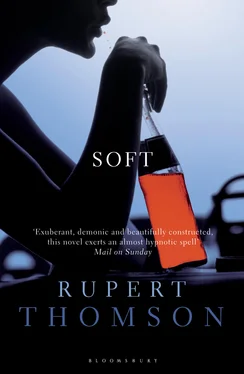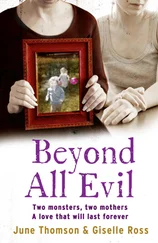‘… so it’s with great reluctance and considerable regret,’ Connor was saying, ‘that we, as a company, have accepted Tony Ruddle’s resignation. For almost eleven years now Tony has been …’
So that was what Ruddle had been talking about the other day. Jimmy glanced at Neil, who raised an eyebrow.
‘Did you know?’ Jimmy whispered.
Neil shook his head.
‘… and we’d like to take this opportunity to wish him well in his new life …’
Before Jimmy could start speculating on the effect this might have on his career, Connor paused significantly. When he began again, his voice had dropped a register, acquired new gravity.
‘There have been certain rumours circulating in the industry during the past few weeks,’ he said, ‘certain allegations of impropriety and wrongdoing …’
A hush descended on the room.
‘Obviously I don’t intend to dignify these allegations with any kind of response,’ Connor said, his eyes moving slowly along the rows of journalists. ‘The whole idea, as I understand it, is repugnant and unethical. The whole idea’s absurd, in fact. All I can say is, if the competition are resorting to this kind of mud-slinging, then they must be pretty worried …’
One or two people chuckled.
‘All I can say is,’ and Connor smiled down, ‘we must be doing something right …’
Doing something right, Jimmy thought. Good line.
After his statement Connor took questions. The journalists were unusually benign; they seemed cowed by his performance, almost sycophantic. As Jimmy moved towards the back of the room, though, he noticed a young man rise up out of the audience. He was roughly Jimmy’s age. With his smoke-grey RAF greatcoat and his hair tied back in a pony-tail, he looked more like a student than a member of the press.
‘At the back there,’ Connor said.
‘Where’s Glade Spencer?’ the student said.
The room stirred like someone half-woken out of a deep sleep.
‘I’m afraid I don’t understand the question,’ Connor said. ‘Perhaps I didn’t hear it correctly …’
‘You heard,’ the student muttered. But then he repeated the question, his voice louder now, a space between each word. ‘Where’s Glade Spencer?’
‘I’m sorry,’ Connor said. ‘I don’t know anyone by that name.’ He glanced towards the exit. Two security guards began to make their way along the edges of the room. One of them, Jimmy saw, was Bob.
The student was brandishing a folded newspaper. ‘Glade Spencer is one of the innocent people your company exploited,’ he shouted. ‘You exploited her, and now she’s dead —’
Taking an arm each, the two guards steered him towards the door. He was still shouting over his shoulder: a girl was dead, and ECSC UK were responsible. During the struggle he dropped his paper. Jimmy walked over and picked it up. In the background Connor was pointing out the dangers of rumour and gossip, how it brought ‘all kinds of people out of the woodwork’.
Once outside the room, Jimmy studied the paper. It had been folded in half, then folded again, which meant the top-right quarter of page nine faced upwards. A small article under the heading News in brief had a square drawn round it in black felt-tip.
Plunge couple mystery
The bodies of a man and a young woman were found on the Lincolnshire coast yesterday. Barker Dodds, 38, and Glade Spencer, 23, were last seen in the vicinity of the Humber Bridge on Monday evening. Police are appealing to anyone who might have information on the couple to come forward.
Jimmy had the curious feeling that this was something he already knew about — and yet the people’s names and the location meant nothing to him. Then he remembered Karen’s story of the night before — the bodies in the swimming-pool, the drownings …
After scanning the article again, he shook the newspaper out and looked for a date. It was five days old.
‘What’ve you got there?’ Neil said.
Jimmy showed Neil the paper. ‘That guy who was shouting, it belonged to him.’ He waited until Neil had read the article. ‘You think she was one of ours?’
‘One of ours?’ Neil gave him an acidic glance. ‘What was your name for them? Ambassadors?’ When Jimmy didn’t answer, Neil shrugged. ‘I’ll tell you what I think. I think this whole thing’s going to blow up in our faces.’ He paused. ‘Boom,’ he said, then walked away.
Jimmy drove home slowly, thoughtfully, his jacket on the seat beside him, his shirtsleeves rolled. As he waited at a set of traffic-lights in Maida Vale he caught sight of a woman in a first-floor window, above a shop. She was leaning on the window-sill in a beige slip, the warm, gold light of early autumn colouring her hair, her shoulders. She looked like someone nothing bad could happen to. She looked immune. To his surprise, he found he envied her. For the last few hours he had had the sense that things were turning against him. He felt strangely unanchored. Adrift. His bones seemed to be floating inside his skin.
That morning, after the press conference, he had walked up to Connor and congratulated him on his performance. Connor smiled stiffly, but said nothing; the ease and calmness that had always come so naturally to him suddenly appeared to require an effort. At one point Jimmy took a quick breath, thinking he might ask something, then he decided that the timing was inappropriate. But Connor had already noticed, of course.
‘You have a question, James?’
Jimmy hesitated. ‘Glade Spencer …’
‘Yes?’ Connor was looking directly into Jimmy’s eyes.
‘Who was she?’
‘Who was she?’ Connor said. ‘I honestly don’t know.’
His gaze had no depth to it, only surface, and the surface was hard and shiny, like lacquer or enamel. In the end Jimmy had to look away, as if he was the guilty party. As if the responsibility was his.
A horn sounded behind him.
‘All right, all right,’ he muttered.
He let the clutch out fast and pulled away from the lights, leaving the woman leaning on her window-sill, not thinking anything, just breathing, dreaming.
RUPERT THOMSONis the author of eight highly acclaimed novels, of which Air and Fire and The Insult were shortlisted for the Writer’s Guild Fiction Prize and the Guardian Fiction Prize respectively. His most recent novel, Death of a Murderer , was shortlisted for the 2008 Costa Novel Award. His memoir This Party's Got to Stop was published in 2010.












